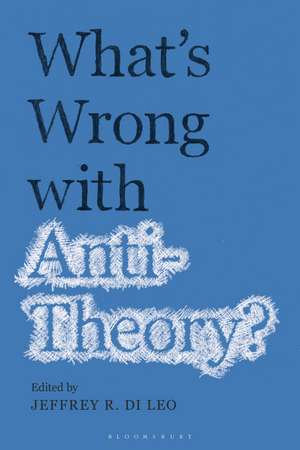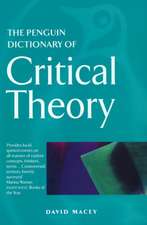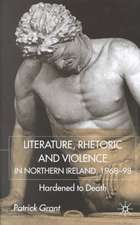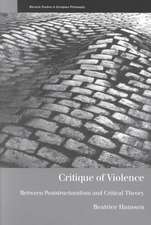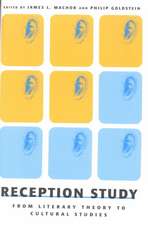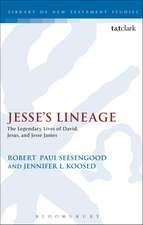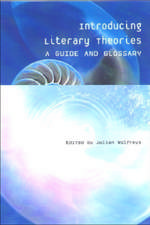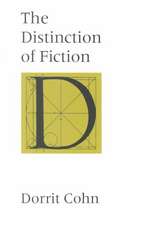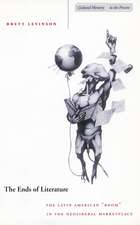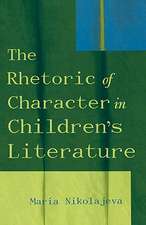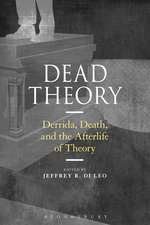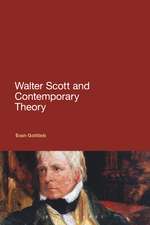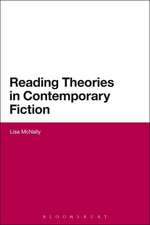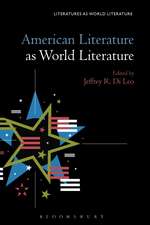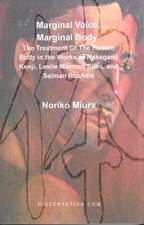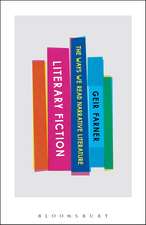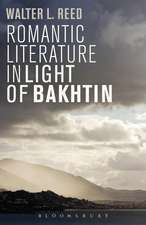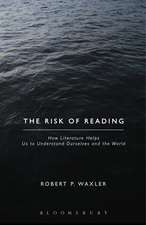What’s Wrong with Antitheory?
Editat de Professor Jeffrey R. Di Leoen Limba Engleză Hardback – 13 noi 2019
| Toate formatele și edițiile | Preț | Express |
|---|---|---|
| Paperback (1) | 219.19 lei 6-8 săpt. | +72.71 lei 7-13 zile |
| Bloomsbury Publishing – 19 mai 2021 | 219.19 lei 6-8 săpt. | +72.71 lei 7-13 zile |
| Hardback (1) | 658.18 lei 6-8 săpt. | |
| Bloomsbury Publishing – 13 noi 2019 | 658.18 lei 6-8 săpt. |
Preț: 658.18 lei
Preț vechi: 944.11 lei
-30% Nou
Puncte Express: 987
Preț estimativ în valută:
125.95€ • 130.75$ • 105.03£
125.95€ • 130.75$ • 105.03£
Carte tipărită la comandă
Livrare economică 22 martie-05 aprilie
Preluare comenzi: 021 569.72.76
Specificații
ISBN-13: 9781350096110
ISBN-10: 1350096113
Pagini: 304
Dimensiuni: 156 x 234 mm
Greutate: 0.59 kg
Editura: Bloomsbury Publishing
Colecția Bloomsbury Academic
Locul publicării:London, United Kingdom
ISBN-10: 1350096113
Pagini: 304
Dimensiuni: 156 x 234 mm
Greutate: 0.59 kg
Editura: Bloomsbury Publishing
Colecția Bloomsbury Academic
Locul publicării:London, United Kingdom
Caracteristici
The first book to explore the history of opposition to "theory" up the present day
Notă biografică
Jeffrey R. Di Leo is Professor of English and Philosophy and Dean of the School of Arts and Sciences at the University of Houston-Victoria, USA. He is editor of the American Book Review, founding editor of the journal symploke, and executive director of the Society for Critical Exchange and its Winter Theory Institute.His previous publications include Dead Theory: Derrida, Death, and the Afterlife of Theory (2016), American Literature as World Literature (2017), and The Bloomsbury Handbook of Literary and Cultural Theory (2019).
Cuprins
Notes on ContributorsAcknowledgments Introduction: Antitheory and its DiscontentsJeffrey R. Di Leo, University of Houston-Victoria, USA Part 1 Antitheory as Theory 1 Antitheory 2.0: The Case of Derrida and the Question of Literature Jeffrey Nealon, Penn State University, USA2 Crisis Theory after CrisisPeter Hitchcock, CUNY Graduate Center and Baruch College of the City University of New York, USA3 Epic Fail: Prolegomenon to Failing Again, Finally Irving Goh, National University of Singapore, Singapore4 Antitheory, Positivism, and Critical Pedagogy Kenneth J. Saltman, University of Massachusetts Dartmouth, USA5 Down with Theory!: Reflections on the Ends of AntitheoryJeffrey R. Di Leo Part 2 Reading as Antitheory 6 Critique Unlimited Robert T. Tally Jr., Texas State University, USA7 How Not to be Governed Like That: Theory Steams On Robin Truth Goodman, Florida State University, USA8 Antitheory in Postcolonial Perspective Nicole Simek, Whitman College, USA9 Eaten Alive, or, Why the Death of Theory is not Antitheory Christian Haines, Pennsylvania State University, USA10 Theory as Meatgrinder Harold Aram Veeser, City College of New York (English Department) and the CUNY Graduate Center (Middle East and Middle-Eastern American Center), USA Part 3 Philosophy, Theory, and Antitheory 11 Theory Does Not Exist Paul Allen Miller, University of South Carolina, USA12 (Anti)Theory's Resistances Tom Eyers, Duquesne University, USA13 Forget Latour Zahi Zalloua, Whitman College, USA14 After Anti-foundationalism: Ten Theses on the Limits of Antitheory Christopher Breu, Illinois State University, USA Index
Recenzii
In the introduction to this collection, Di Leo (English and philosophy, Univ. of Houston, Victoria) addresses the issues of theory in the 21st century. Most of the contributors of the 14 essays are drawn from the humanities, notably literature and philosophy. The essays approach theory through the perspective of "antitheory," which began as a resistance to theory but inevitably broadened its reach. Di Leo organizes the collection in three sections: "Antitheory as Theory" (five essays), "Reading as Antitheory" (five essays), and "Philosophy, Theory, and Antitheory" (four essays). The collection is timely, as university structures succumb to neoliberal pressures to commodify the humanities. Over the past 50 years or so theory has been denigrated as the death knell for the humanities; the implicit argument of the present collection is that theory is a way to save the humanities. Addressing the contemporary state of the humanities from both historical and conceptual viewpoints, What's Wrong with Antitheory opens a necessary discussion. Summing Up: Recommended.
ReviewsNow that Theory is a New York based international fashion brand and that even the zealots of anti-theory have run out of steam, we need to assess what the theory wars have given birth to: dangerous presents announcing an uncertain future. In order to prevent a general sell-out, clear-sighted judgments are required, such as these provided with rigor and verve by the authors gathered in What's Wrong with Anti-Theory. The survival of philosophical approaches to the text, despite dire predictions and the accelerations of the fashion industry, leaves us with a serious task, and it begins here.
What's Wrong with Antitheory? is a most acute, thoughtful, and, by the way, highly theoretical impact report on contemporary critical theory's multifaceted contributions over the past half century. More than anything else, "antitheory" is to be understood in the sense of "antimatter." It is far less a dismissal or resistance to theoretical speculation than the environmental surround upon which the imprint of critical theory has registered. The volume bespeaks a hunger on the part of a diverse critical subculture to address some of the tangible, often unattended socio-political and economic preconditions for theoretical deliberation; also, many of the unintended repercussions of what started as rigorously open-ended, unbound critical inquiry. What's Wrong with Antitheory? encompasses a broad and wonderfully diverse range of interventions registering the "antitheoretical" phenomenon. The volume renders particular service to younger readers addressing the daunting task of placing their own work within the current map of cultural exegesis at a moment of seismic shift in global communications and administrative orders.
Antitheory capitalizes on the decline of higher education, celebrates the impoverishment of thinking, relishes solipsism, criticizes in bad faith, and-get this-has the audacity to call itself Theory! This superb volume of essays explores these and other troubling features of antitheory-above all showing why antitheory is wrong six ways from Sunday. Composed by expert readers in Theory well versed in current debates, every chapter forcefully demonstrates that the fate of the humanities in these stupid times depends on the vitality of Theory in its most critical and revolutionary form.
ReviewsNow that Theory is a New York based international fashion brand and that even the zealots of anti-theory have run out of steam, we need to assess what the theory wars have given birth to: dangerous presents announcing an uncertain future. In order to prevent a general sell-out, clear-sighted judgments are required, such as these provided with rigor and verve by the authors gathered in What's Wrong with Anti-Theory. The survival of philosophical approaches to the text, despite dire predictions and the accelerations of the fashion industry, leaves us with a serious task, and it begins here.
What's Wrong with Antitheory? is a most acute, thoughtful, and, by the way, highly theoretical impact report on contemporary critical theory's multifaceted contributions over the past half century. More than anything else, "antitheory" is to be understood in the sense of "antimatter." It is far less a dismissal or resistance to theoretical speculation than the environmental surround upon which the imprint of critical theory has registered. The volume bespeaks a hunger on the part of a diverse critical subculture to address some of the tangible, often unattended socio-political and economic preconditions for theoretical deliberation; also, many of the unintended repercussions of what started as rigorously open-ended, unbound critical inquiry. What's Wrong with Antitheory? encompasses a broad and wonderfully diverse range of interventions registering the "antitheoretical" phenomenon. The volume renders particular service to younger readers addressing the daunting task of placing their own work within the current map of cultural exegesis at a moment of seismic shift in global communications and administrative orders.
Antitheory capitalizes on the decline of higher education, celebrates the impoverishment of thinking, relishes solipsism, criticizes in bad faith, and-get this-has the audacity to call itself Theory! This superb volume of essays explores these and other troubling features of antitheory-above all showing why antitheory is wrong six ways from Sunday. Composed by expert readers in Theory well versed in current debates, every chapter forcefully demonstrates that the fate of the humanities in these stupid times depends on the vitality of Theory in its most critical and revolutionary form.
